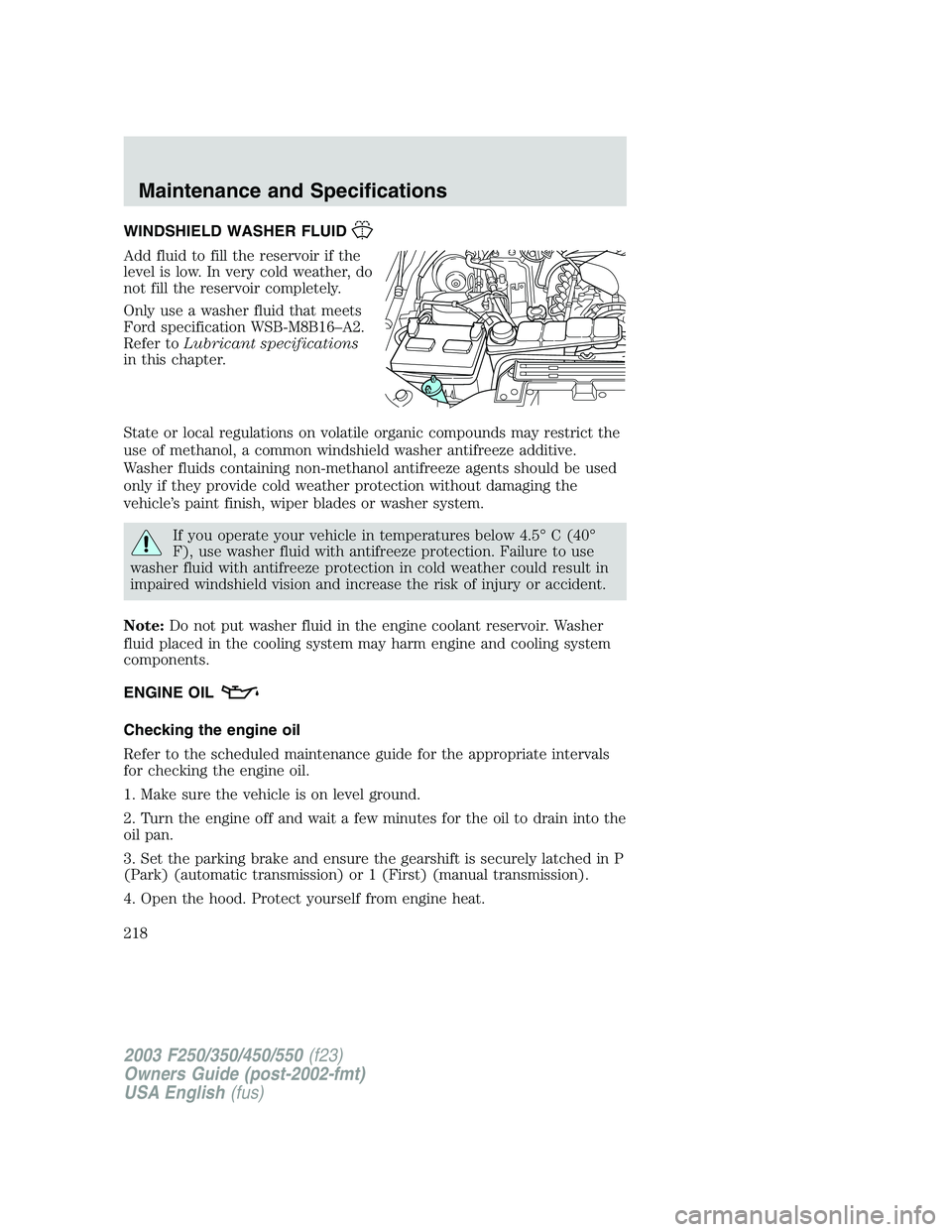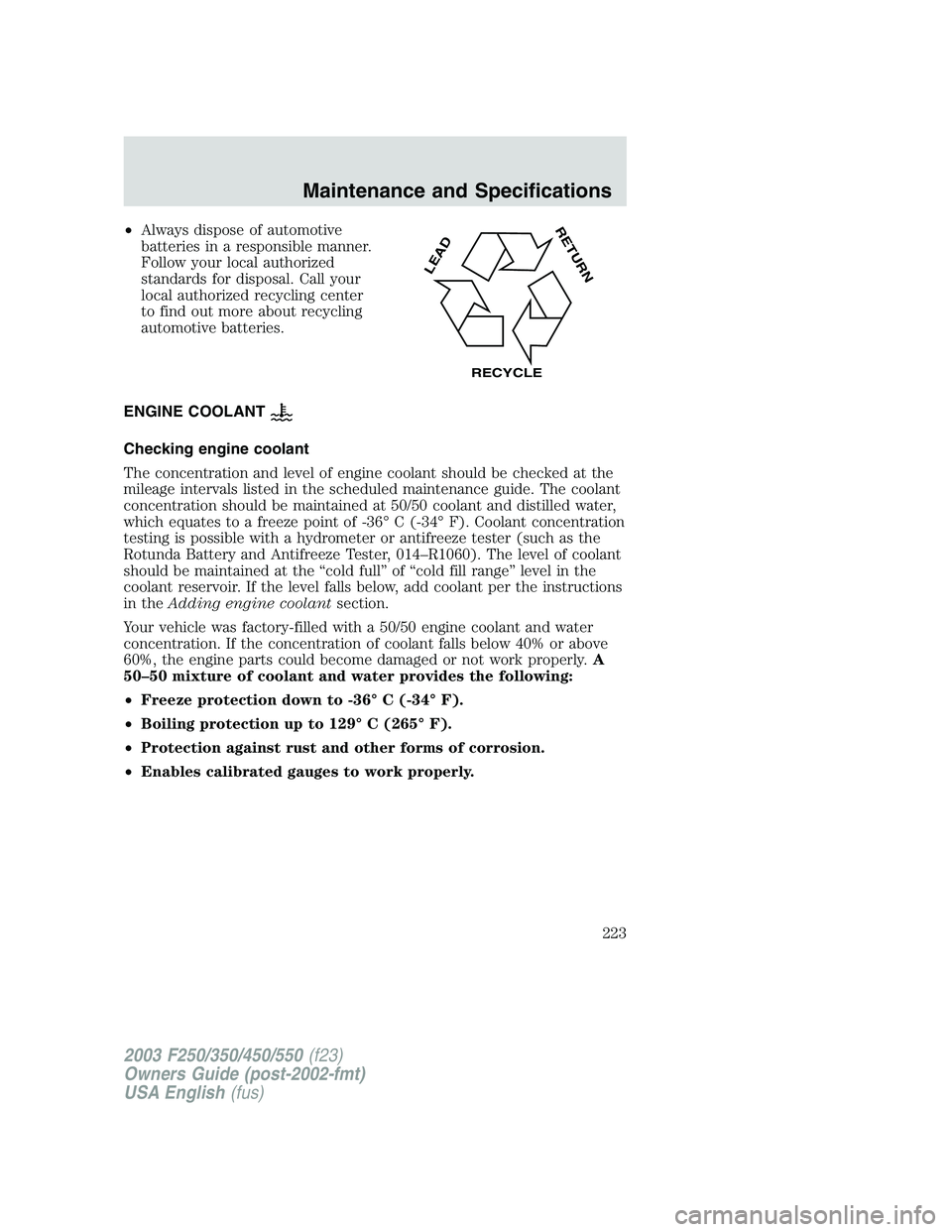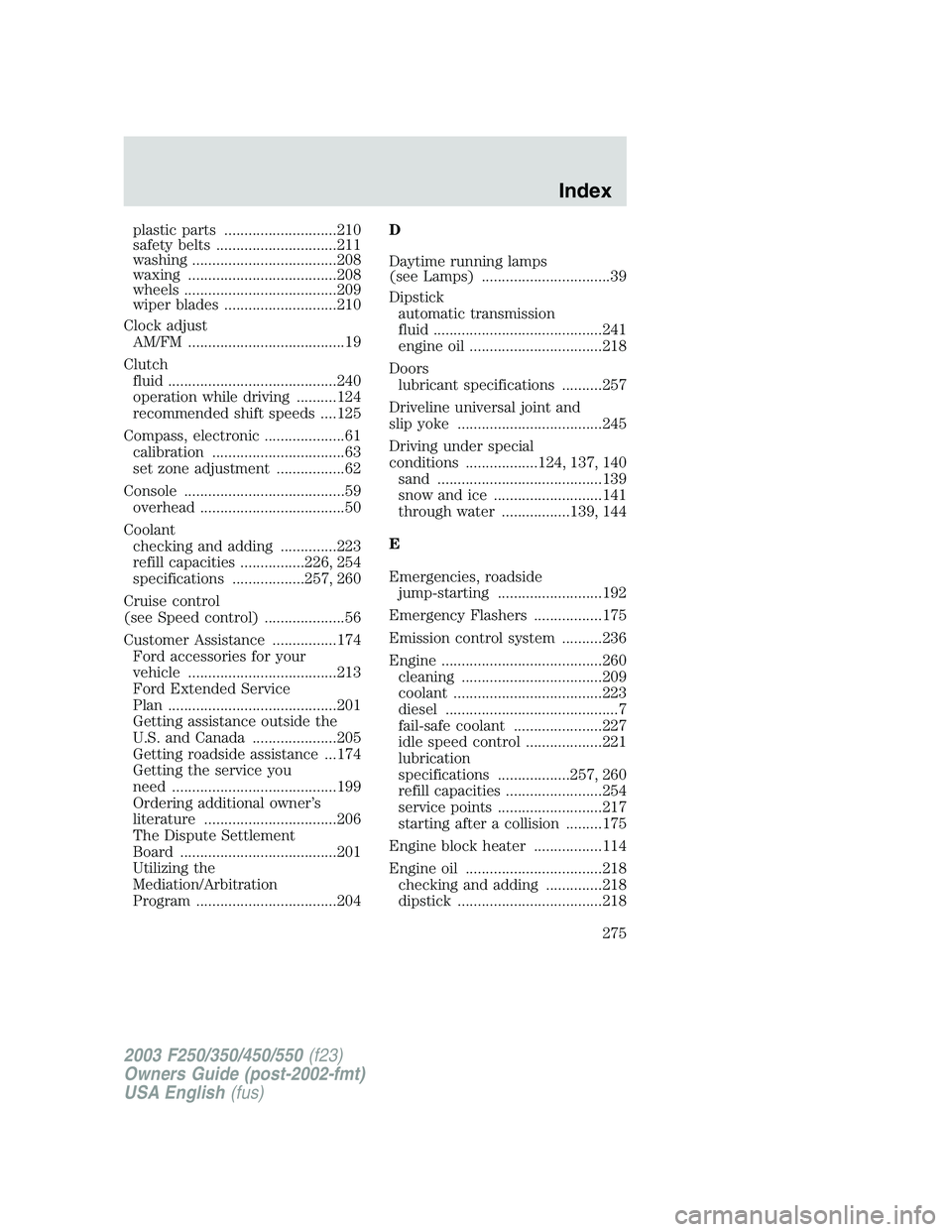Page 218 of 280

WINDSHIELD WASHER FLUID
Add fluid to fill the reservoir if the
level is low. In very cold weather, do
not fill the reservoir completely.
Only use a washer fluid that meets
Ford specification WSB-M8B16–A2.
Refer toLubricant specifications
in this chapter.
State or local regulations on volatile organic compounds may restrict the
use of methanol, a common windshield washer antifreeze additive.
Washer fluids containing non-methanol antifreeze agents should be used
only if they provide cold weather protection without damaging the
vehicle’s paint finish, wiper blades or washer system.
If you operate your vehicle in temperatures below 4.5°C (40°
F), use washer fluid with antifreeze protection. Failure to use
washer fluid with antifreeze protection in cold weather could result in
impaired windshield vision and increase the risk of injury or accident.
Note:Do not put washer fluid in the engine coolant reservoir. Washer
fluid placed in the cooling system may harm engine and cooling system
components.
ENGINE OIL
Checking the engine oil
Refer to the scheduled maintenance guide for the appropriate intervals
for checking the engine oil.
1. Make sure the vehicle is on level ground.
2. Turn the engine off and wait a few minutes for the oil to drain into the
oil pan.
3. Set the parking brake and ensure the gearshift is securely latched in P
(Park) (automatic transmission) or 1 (First) (manual transmission).
4. Open the hood. Protect yourself from engine heat.
2003 F250/350/450/550(f23)
Owners Guide (post-2002-fmt)
USA English(fus)
Maintenance and Specifications
218
Page 219 of 280
5. Locate and carefully remove the
engine oil level indicator (dipstick).
6. Wipe the indicator clean. Insert the indicator fully, then remove it
again.
•If the oil level isbetween the MIN and MAX marks,the oil level is
acceptable.DO NOT ADD OIL.
•If the oil level is below the MIN
mark, add enough oil to raise the
level within the MIN-MAX range.
•Oil levels above the MAX mark may cause engine damage. Some oil
must be removed from the engine by a service technician.
7. Put the indicator back in and ensure it is fully seated.
Adding engine oil
1. Check the engine oil. For instructions, refer toChecking the engine
oilin this chapter.
2. If the engine oil level is not within the normal range, add only certified
engine oil of the recommended viscosity. Remove the engine oil filler cap
and use a funnel to pour the engine oil into the opening.
2003 F250/350/450/550(f23)
Owners Guide (post-2002-fmt)
USA English(fus)
Maintenance and Specifications
219
Page 223 of 280

•Always dispose of automotive
batteries in a responsible manner.
Follow your local authorized
standards for disposal. Call your
local authorized recycling center
to find out more about recycling
automotive batteries.
ENGINE COOLANT
Checking engine coolant
The concentration and level of engine coolant should be checked at the
mileage intervals listed in the scheduled maintenance guide. The coolant
concentration should be maintained at 50/50 coolant and distilled water,
which equates to a freeze point of -36°C (-34°F). Coolant concentration
testing is possible with a hydrometer or antifreeze tester (such as the
Rotunda Battery and Antifreeze Tester, 014–R1060). The level of coolant
should be maintained at the“cold full”of“cold fill range”level in the
coolant reservoir. If the level falls below, add coolant per the instructions
in theAdding engine coolantsection.
Your vehicle was factory-filled with a 50/50 engine coolant and water
concentration. If the concentration of coolant falls below 40% or above
60%, the engine parts could become damaged or not work properly.A
50–50 mixture of coolant and water provides the following:
•Freeze protection down to -36°C (-34°F).
•Boiling protection up to 129°C (265°F).
•Protection against rust and other forms of corrosion.
•Enables calibrated gauges to work properly.
LEAD
RETURN
RECYCLE
2003 F250/350/450/550(f23)
Owners Guide (post-2002-fmt)
USA English(fus)
Maintenance and Specifications
223
Page 275 of 280

plastic parts ............................210
safety belts ..............................211
washing ....................................208
waxing .....................................208
wheels ......................................209
wiper blades ............................210
Clock adjust
AM/FM .......................................19
Clutch
fluid ..........................................240
operation while driving ..........124
recommended shift speeds ....125
Compass, electronic ....................61
calibration .................................63
set zone adjustment .................62
Console ........................................59
overhead ....................................50
Coolant
checking and adding ..............223
refill capacities ................226, 254
specifications ..................257, 260
Cruise control
(see Speed control) ....................56
Customer Assistance ................174
Ford accessories for your
vehicle .....................................213
Ford Extended Service
Plan ..........................................201
Getting assistance outside the
U.S. and Canada .....................205
Getting roadside assistance ...174
Getting the service you
need .........................................199
Ordering additional owner’s
literature .................................206
The Dispute Settlement
Board .......................................201
Utilizing the
Mediation/Arbitration
Program ...................................204D
Daytime running lamps
(see Lamps) ................................39
Dipstick
automatic transmission
fluid ..........................................241
engine oil .................................218
Doors
lubricant specifications ..........257
Driveline universal joint and
slip yoke ....................................245
Driving under special
conditions ..................124, 137, 140
sand .........................................139
snow and ice ...........................141
through water .................139, 144
E
Emergencies, roadside
jump-starting ..........................192
Emergency Flashers .................175
Emission control system ..........236
Engine ........................................260
cleaning ...................................209
coolant .....................................223
diesel ...........................................7
fail-safe coolant ......................227
idle speed control ...................221
lubrication
specifications ..................257, 260
refill capacities ........................254
service points ..........................217
starting after a collision .........175
Engine block heater .................114
Engine oil ..................................218
checking and adding ..............218
dipstick ....................................218
2003 F250/350/450/550(f23)
Owners Guide (post-2002-fmt)
USA English(fus)
Index
275